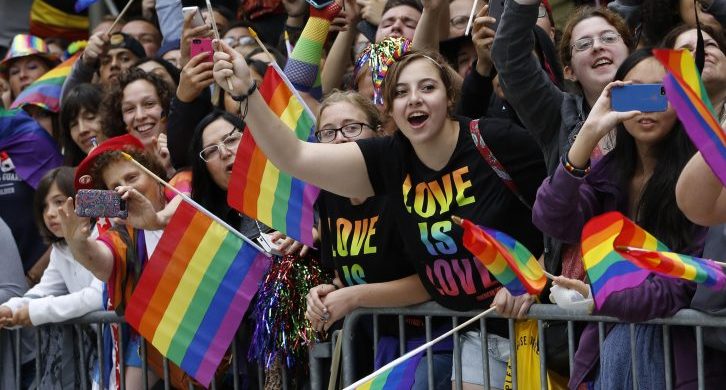I noticed from the latest round-up of Truthbomb Apologetics that Chad had found some interesting news about Jen Hatmaker. I remember that Jen Hatmaker, like Beth Moore, used to be a Southern Baptist and then left the denomination. When I think about the kinds of Christians I look up to, I think of Walter Bradley, Stephen C. Meyer, Jay Richards, etc. Why the difference?
First, let’s see the latest news about Jen Hatmaker, in the far-left New York Times: (archived)
Jen Hatmaker went through a drastic middle-age crisis like that. Twice. Hatmaker, who is 51, had built a career as a Christian women’s influencer, best-selling author and TV personality — all along modeling a lighthearted, relatable yet enviable family lifestyle for evangelical women. Then, about a decade ago, she went through a public shift away from some of her most conservative stances on things like gay marriage.
The thing is, I want to know why she was a Christian influencer in the first place. When I am picking a Christian influencer, I am picking people who allow me to defend the Boss and disciple Christians in areas that are being challenged. So, I care about what James Tour says about the origin of life. I care about what Jay Richards says about economics. I care about what Sean McDowell says about the gospels. Why would I care about someone who makes me feel things about my own life? There is a war on, and I want to know how to train, fight, lead and win about what’s actually true. I don’t have a me-centered view of Christianity. I am on a truth quest, not a happiness quest.
More from the article:
On your website, you say, “I used to be a darling of the evangelical women’s subculture, but now I am a bit of a problem child.” How did you become a darling? I grew up in a really traditional, regimented Christian environment, the Southern Baptist world. I had always been good at being good, so that was a great environment for me to succeed in because it’s rules based: This is what we do, this is what we don’t do, this is what we believe, this what we don’t believe. I went to a Baptist college, and I married a ministry major. We immediately went into full-time ministry. But the way that it works in church is a two-for-one approach: His job was my second job. I was a teacher, but I was at every single church thing that existed. Then when I was 29, I wrote my first book. Miraculously it got published, it became a five-book contract, and thus began my ascent into evangelical lady subculture.
Notice what she says here, that the Southern Baptist world is a “rules based” world. And that’s what I’ve seen as well, and I would extend it to every conservative denomination. What’s emphasized there is behaviors and community. What is not emphasized is truth. That’s why they produce people like Russell Moore and Brent Leatherwood. Those people are great at feeling good and being liked by non-Christians. But they have literally no knowledge or skills when it comes to defending the Bible’s truth claims and commandments. They don’t speak or write about evidential apologetics, and they have no evidence-based defense for any of the Bible’s moral teachings that would work on a non-Christian.
My view of Christianity is totally different from their “I’ll follow the parent and church rules, and that entitles me to happiness, community and success”. My view is “the Bible is full of truth claims and moral commands. Jesus gave arguments and evidence for those truth claims and commands. I have access to the Holy Spirit to help me do the same. How can I manage the resources that God has entrusted to me well, so that I can promote his truth and commands most powerfully and persuasively?”
I just don’t have the expectation that “following the rules” will lead to a happy life of social acceptance. When I read military history, what I see is a lot of people sacrificing their happiness and even safety in order to serve their commanding officer. (2 Tim 2:3-4) Not sure how anyone can read the Bible and not get the idea that with respect to God’s purposes in the world, our happiness and popularity are expendable. Also, people who suffer while following the Boss are the most honorable and blessed. I’m really wondering whether people like Jen Hatmaker, Rachel Hollis, Glennon Doyle Melton, etc. have ever read and understood the Bible at all.

Apparently, getting soft on Jesus’ definition of marriage is a big winner with evangelical women:
Maybe 10 days before the 2016 election, I gave an interview to the Religious News Service in which I said, I’ve changed my mind on this, and I’m in full affirmation of the L.G.B.T.Q.I.A. community. That was it. My books were pulled off shelves the next day. My most successful book was put out of print. All my speaking engagements were canceled. My publisher put out a press release the next day against me. I thought my career was over, but then to my surprise, my community began backfilling with hundreds of thousands of primarily women who were in a similar seat as me going, This is what we were raised in, this is what we were taught, but this is no longer holding. That began a whole new period of my life.
So, I am pretty strong on defending marriage. I’ve written secular cases against no-fault divorce, the sexual revolution, cohabitation, premarital sex, same-sex marriage, etc. Rose and I have done podcast episodes about it. And in every case, I’m making logical arguments, I’m quoting secular data, like studies on how children do best with their biological mother and father. But, I guess knowing how to fight to defend the Bible is not a really big priority in conservative denominations. Instead, they prefer feminized priorities: making people feel good, making people be liked. It’s like it doesn’t matter to anyone what Jesus says about sexual issues, because Jesus has a higher goal: making his followers feel good and be liked by non-Christians. And that’s what makes women like Hatmaker and Moore famous in evangelical circles.
Well, I don’t know anything about Christian women. I don’t read books by the authors that are popular with women. I don’t listen to the music that is popular with women. I don’t watch the movies that are popular with women. I just don’t understand how women can go through a Christian upbringing and then come out like Jen Hatmaker, raging against chastity and natural marriage, and not bothering to do a stitch of actual research about either. When I go to a car mechanic, I want an expert to fix the car. Why do so many Christian women choose someone who is not an expert at anything related to Christian truth and ethics?

My thoughts
I asked Grok why Hatmaker and Moore are so popular with evangelical women when they can’t advocate for the Bible’s truth claims and moral teachings with reason and evidence, the way that Jesus and Paul, etc. did in the Bible when dealing with skeptics and enemies.
And here is what Grok said:
Jen Hatmaker and Beth Moore’s popularity among evangelical women stems from their relatable personas, emotional authenticity, and ability to connect through storytelling, social media, and accessible teachings. Hatmaker’s humor and transparency about family life, combined with Moore’s passionate Bible studies, resonate with women seeking inspiration and community, often filling gaps left by male-dominated church structures. Their platforms, amplified by books, podcasts, and events, create a sense of intimacy and empowerment, appealing to women navigating faith in modern contexts.
Critically, their appeal lacks the intellectual rigor of apologists like Jay Richards or William Lane Craig, focusing instead on emotional engagement over evidential apologetics. Their shift toward progressive stances—Hatmaker’s support for gay marriage and abortion rights, Moore’s critiques of evangelical Trumpism—diverges from traditional evangelical values, yet retains followers due to their emphasis on compassion and inclusion. This may reflect some women’s preference for affirming, less confrontational messages, possibly tied to cultural trends toward entitlement or people-pleasing, though it risks diluting doctrinal accountability. Their limited engagement against feminism, socialism, or atheism, and alignment with leftist politics, suggests their influence lies more in emotional resonance than theological or ideological consistency, which may not deter women prioritizing relatability over orthodoxy.
I would never rely on someone like this do achieve anything that had to work in the real world.
I always wanted to partner with Christian women who advocate for God with non-Christians using reason and evidence. If you look at my podcast with Desert Rose, that’s what I think women should be like. In that podcast, I promote women’s voices who I admire and respect like Natasha Crain, Shanda Fulbright, Terrell Clemmons, etc. But it sure does seem like the bulk of Christian women have a totally different way of approaching Christianity than I do.








